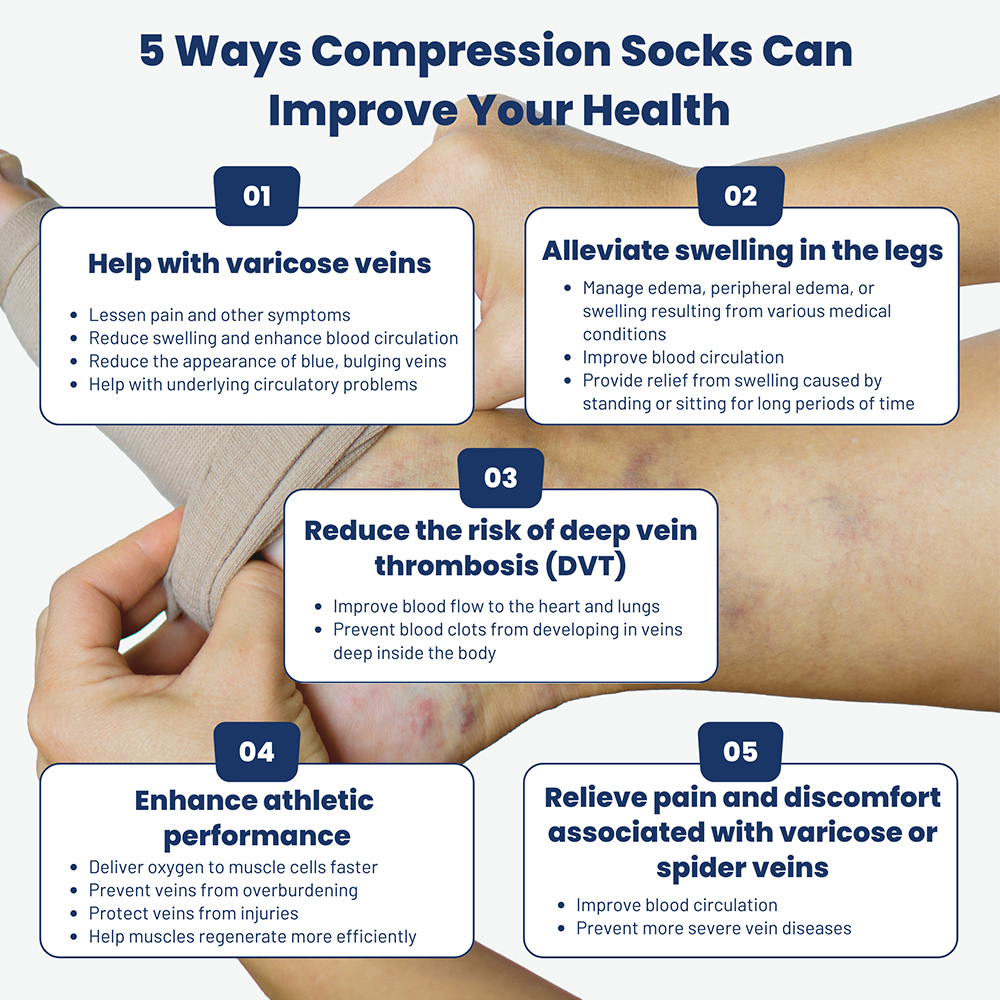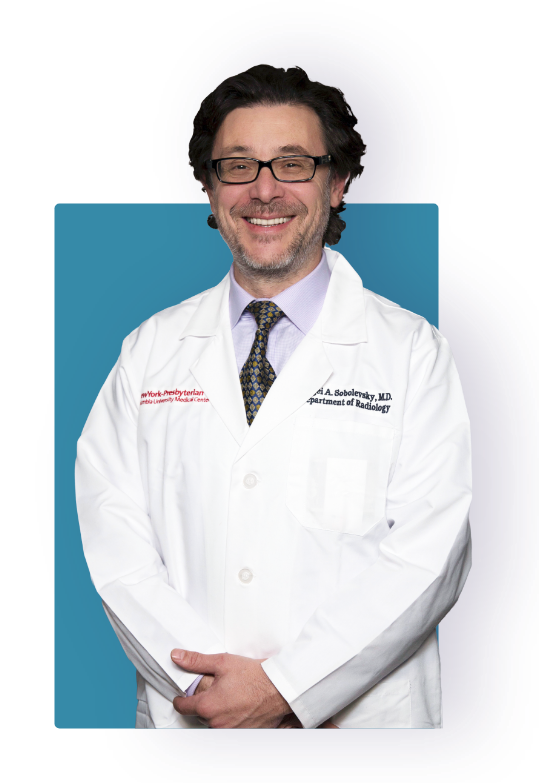If your legs feel tired and achy and you notice swelling in the feet and ankles, consult a doctor to have your condition accurately diagnosed and treated. Knowing about the possible causes of these symptoms can help to identify any underlying medical condition or prevent and treat spider and varicose veins timely before they lead to serious vein diseases like blood clots and venous ulcers. As the best vein specialist Dr. Sergei Sobolevsky at the Downtown Vein & Vascular Center eases the pain and heaviness on your legs by coming up with the best treatment plans and recommending measures for quick relief, such as compression socks.
What Are Compression Socks?
Made from snug-fitting stretchy spandex, compression socks or stockings, as they are popularly known, are used for medical as well as athletic purposes. Compression socks are approved and prescribed by doctors for their therapeutic support. They have proved effective in improving blood flow when veins do not work as they should, and blood begins to pool in the lower extremities of the body like the legs.
As the health benefits of compression socks become popular, people suffering from muscle fatigue, leg cramps, and swelling use them to prevent these painful conditions. These stockings apply extra squeeze or pressure to the veins so that the blood can return to the heart efficiently.
Read more: What Causes Dark Spots on Your Legs and How Treat Them?
How Compression Socks Work?
Compression socks are designed with unique features to help the wearers. Athletic compression socks have special stitching that provides pressure and support in specific areas, like the calves or arch of the foot. On the other hand, medical-grade compression socks are tighter in the ankle and gradually less restrictive as they move up the leg.
Medical grade compression stockings are proposed for patients with a history of diabetes, chronic venous insufficiency, deep vein thrombosis, cardiac insufficiency, and varicose and spider veins. They prevent blood pooling and ensure the normal return of blood to the heart.
Veins have one-way valves that prevent the backflow of blood and support blood flow in one direction, from extremities and organs back to the heart. When veins do not work as they should, it can lead to accumulation of blood in lower areas like legs that causes cramps, ankle discoloration, and other vein diseases. The support from compression socks enhances circulation and offers relief from muscle fatigue, foot pain, and shin splints. It also speeds up recovery in certain conditions.
Who Needs Compression Socks?
These socks work best for people who experience heaviness in legs, lower limb swelling, or want to prevent clotting after a surgical procedure. They are equally beneficial for people with a sedentary lifestyle.
People who sit or stand for hour hours like on planes or road trips can experience a change in the pressure in veins and even end up damaging or weakening their valves need compression socks to deal with the resulting discomfort. Pregnant women also need to wear compression socks sometimes to prevent blood from pooling in their veins and reduce elevated heart rates.
These problems could be a sign of some underlying vein disease or lead to severe health conditions if they are not treated timely, so it is necessary to seek medical help if your symptoms persist. Dr. Sergei Sobolevsky at the Downtown Vein & Vascular Center understands the various vein problems and symptoms you could be facing and provides valuable advice on alleviating them as soon as possible with the right-fitting compression socks.
Read more: What Causes Swollen Legs from the Knee Down?
Benefits of Wearing Compression Socks
Discover the 5 benefits of wearing compression socks and learn how these special garments work for you.
They Help with Varicose Veins
Compression socks lessen the pain and other symptoms associated with varicose veins. Doctors advise them both before and after the treatment to reduce swelling and enhance blood circulation. They can even reduce the appearance of blue, bulging veins and help with underlying circulatory problems. Compression socks also ease the discomfort associated with varicose or spider veins and prevent more severe vein diseases.
They Alleviate Swelling in the Legs
Compression socks help to manage edema, peripheral edema, or swelling resulting from various medical conditions in which the body begins to retain fluid. Some of these conditions include heart failure, kidney disease, and pregnancy. Whether you have a medical condition or get swelling in the legs after standing or sitting for long hours, compression socks provide relief by improving blood circulation when they are worn throughout the day.
They are particularly beneficial for people at high risk of developing blood clots in their legs after surgery or those who need bed rest for any reason. Doctors recommend wearing compression stockings to reduce the chances of clotting while they are not active as usual.
People suffering from orthostatic hypotension also benefit from wearing compression socks at night. Orthostatic hypotension is a condition that causes dizziness or sometimes complete loss of consciousness when moving from lying down to standing up. Compression socks support the flow of blood from legs to heart and brain without requiring extensive treatments and long-term use of medications that cause side effects in the long.
They Enhance Athletic Performance
Athletes, specifically runners, wear compression socks to improve their performance. It is believed that faster oxygen delivery to muscle cells can result in greater athletic endurance. These stockings prevent the veins from overburdening and protect them from injuries, reducing resulting muscle soreness and swelling. Many athletes have also reported quick and easy recovery after intensive workouts and training when wearing compression stockings as they seem to help muscles regenerate more efficiently.

They reduce the risk of Deep Vein Thrombosis (DVT)
Compression socks prevent deep vein thrombosis, DVT, with improved blood flow to the heart and lungs. DVT is a severe and painful condition in which blood clots can develop in veins deep inside the body. The blood clots can travel to the lungs and cause a serious complication, called pulmonary embolism, and block an artery if they are not addressed timely.
Pregnancy
There are several benefits of wearing compression socks during pregnancy. They increase blood flow, reduce swelling and prevent spider or varicose from developing or deteriorating during this time. Most women suffer from swelling in the legs or are at risk of developing varicose veins due to increased blood flow and pressure on blood vessels or enlarging of veins with baby’s growth.
Wearing compression socks can alleviate the swelling and bulging veins in various conditions, but they must be worn according to the doctor’s instructions. Compression socks should feel good. They should not be tight or uncomfortable. They should apply slight pressure to a sore, damaged muscle and hold it in place to enhance vein performance. Other threatening underlying medical conditions must be carefully diagnosed by an expert vein doctor to avoid further complications.
You can enjoy the maximum advantages of compression stockings by keeping a few important things in mind. They include:
- Getting properly fitted socks
- Following instructions for properly putting them on and removing them
- Following the doctor’s advice on wearing them, for how long they should be worn, if you should wear them to bed or if you should take them off at night
- Monitoring skin changes in the areas that come in contact with the stockings
Compression therapy has proved beneficial for a variety of reasons. The lymph system does not have a pumping mechanism and depends on muscles and joints to keep the fluid moving. Gravity also plays a role here, and the more you stand or sit, the more pooling you can experience. Consult your vein doctor to discover the advantages of wearing compression socks to seek quick relief.
Compression socks are an easy and affordable way to promote good blood circulation and avoid complications that accompany vein disease symptoms. However, correct use of these stockings is crucial for desired results and preventing any further problems. Consulting a vein specialist and getting the best fit for compression socks is essential as they should be snug against the leg and ankle without any wrinkles or bunching.
Dr. Sergei Sobolevsky will determine the best type and size of compression socks for you that provide the most accurate compression and identify the right ways to wear them for maximum benefit. He will also keep an eye on your condition and suggest other effective means for improving painful and uncomfortable vein symptoms to relieve discomfort and swelling in your legs.

Sergei Sobolevsky, MD, is a leading specialist in endovascular medicine with experience in vascular and interventional radiology. Dr. Sobolevsky has decades of experience in the field, with over 25,000 procedures performed, accumulating extensive experience in image-guided minimally invasive medicine, diagnosing and treating a range of conditions.
Dr. Sobolevsky earned his Doctor of Medicine (MD) degree in 1997 from the University of Colorado School of Medicine. He received his specialty clinical training in vascular and interventional radiology at Harvard University. Later, he earned his MBA from the MIT Sloan School of Management. Recognized as a Castle Connolly Top Doctor and named to the Top Doctors New York Metro Area in 2020, 2021, and 2022, Dr. Sobolevsky is licensed in multiple states, has delivered presentations at numerous institutions in the US and abroad, and now acts as a clinical advisor for the biomedical industry. He also held multiple positions in the field during his career, including Chief of Vascular and Interventional Radiology at the Columbia University Medical Center in New York, NY, Senior Vice President in Clinical and Regulatory Affairs at Artann Laboratories in North Brunswick, NJ, and Medical Director at the American Endovascular and Amputation Prevention Center in Brooklyn.
More About Dr. Sobolevsky

